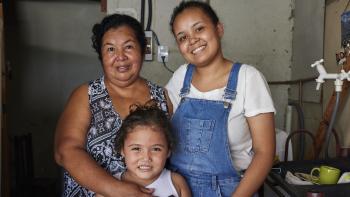Home Equals Opportunity: A G7 Imperative for Gender Equality and Sustainable Development
An Open Letter from Habitat for Humanity International and Partners (June 2025) -
Dear Honorable G7 Leaders,
We write to you with a profound sense of urgency on behalf of more than 1.1 billion people worldwide living in slums and informal settlements—the “invisible billion.” For these individuals, home is not a sanctuary of security, health and opportunity. Instead, it is a place of vulnerability, deprivation, constant fear of eviction, and life-threatening conditions. Women and girls face even greater risks, as they are overrepresented in informal settlements, and their inadequate housing exacerbates existing inequalities in health, education, and economic opportunity. Canada’s leadership on Feminist International Assistance Policy and its role as Summit host make this a uniquely strategic moment to spotlight housing as a powerful lever for promoting gender equality and inclusive development.
Without immediate and deliberate action, the number of people living in inadequate housing conditions will only rise, as it is estimated that over the next 30 years, an additional 2 billion people will move into informal settlements. As you gather at the G7 Summit in Canada, you have an opportunity to change this reality. As the largest contributors to development assistance, G7 nations must prioritize adequate housing as a cornerstone of sustainable development.
Housing is a catalyst for economic progress and human well-being. When people have safe, stable homes, we see reduced poverty, better health, and higher educational attainment—and the impact for women and girls can be even more profound. The ripple effects uplift entire communities and drive progress across the Sustainable Development Goals. For example, Habitat for Humanity’s report released today shows that—within the first year—key improvements in informal settlement housing could prevent 20.3 million illness in women (respiratory infections, enteric infections, chronic obstructive pulmonary disease, reproductive and urinary tract infections, heat sickness); 42.9 million incidents of gender-based violence (intimate partner violence, non-partner sexual violence) and 80,200 maternal and climate-related deaths could be avoided. While housing clearly correlates to improvements in women’s lives, and their communities, it remains a neglected priority in global development discourse and foreign assistance.
To address this, we call on the G7 to:
- Promote policy coherence across the G7: Align domestic and international housing policies to drive systemic change, embedding housing considerations into G7 discussions on sustainable development, gender, health and climate resilience.
- Dedicate foreign assistance to improving lives in informal settlements: Increase targeted investment in housing and urban development, with a focus on sustainable, climate-resilient and gender-responsive solutions for informal settlements. This includes championing innovative slum upgrading with a feminist approach, including pilot projects with key stakeholders to demonstrate the catalytic value of incrementally improving housing for key development outcomes.
- Advance accountability for housing in development assistance: Establish mechanisms to track and report Official Development Assistance (ODA) directed toward adequate housing and informal settlement upgrading, ensuring transparency, accountability and measurable impact. Lead peer governments in an effort to enhance the Organization for Economic Co-operation and Development’s (OECD) measure of housing and slum upgrading as a component of ODA globally—a baseline need in complex data environment. This can be done through the OECD’s Development Assistance Committee and in partnership with other G7 countries.
The G7 has the power and the responsibility to make the “invisible billion” visible. By taking bold action on adequate housing, the G7 can demonstrate its leadership in developing impact by leveraging new tools to achieve human potential, advance global prosperity, and ensure that home truly equals a foundation for a better future.
Jonathan Reckford, CEO,
Habitat for Humanity International
Additional signatories
We stand with Habitat for Humanity International and advocates worldwide in urging you to seize this moment. The time to act is now.
- Habitat for Humanity Australia
- Habitat for Humanity Bolivia
- Habitat for Humanity Brazil
- Habitat for Humanity Bulgaria
- Habitat for Humanity Cambodia
- Habitat for Humanity Canada
- Habitat for Humanity Côte d’Ivoire
- Habitat for Humanity República Dominicana
- Habitat for Humanity Ethiopia
- Habitat for Humanity Egypt
- Habitat for Humanity Fiji
- Habitat for Humanity Germany
- Habitat for Humanity Great Britain
- Habitat for Humanity Guatemala
- Habitat for Humanity Honduras
- Habitat for Humanity Hong Kong
- Habitat for Humanity Hungary
- Habitat for Humanity India
- Habitat for Humanity Ireland
- Habitat for Humanity Japan
- Habitat for Humanity Jordan
- Habitat for Humanity Korea
- Habitat for Humanity Lesotho
- Habitat for Humanity Macedonia
- Habitat for Humanity Mexico
- Habitat for Humanity Netherlands
- Habitat for Humanity Nepal
- Habitat for Humanity New Zealand
- Habitat for Humanity Nicaragua
- Habitat for Humanity Philippines
- Habitat for Humanity Romania
- Habitat for Humanity Singapore
- Habitat for Humanity South Africa
- Habitat for Humanity Tanzania
- Habitat for Humanity Uganda
- Habitat for Humanity Ukraine
- Habitat for Humanity Vietnam
- Habitat for Humanity Zambia
- Huairou Commission
- Institute for Environment and Development (IIED)
- Landesa
- Rooftops Canada - Abri International
- Slum Dwellers International
- Stand For Her Land

